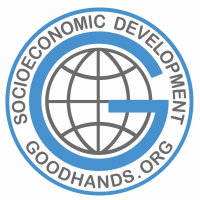Educational Partners: Strengthening Collaboration for Inclusive Learning
Educational partnerships at GoodHands are rooted in the idea that systemic change requires aligned collaboration. By working with schools, local governments, integration centers, and charitable organizations, we help extend access to foundational learning in ways that reflect local needs. These partnerships are not uniform—they are shaped by shared values, institutional capacities, and target group realities. Together, we design adaptable initiatives that complement existing programs while closing persistent gaps. Learning becomes a joint responsibility—and a shared opportunity to foster inclusion and impact.
Working With Municipal Partners to Promote Inclusive Local Education Policies
Local governments play a central role in shaping access to education. GoodHands collaborates with municipal leaders to identify underserved communities, map resource gaps, and develop responsive education strategies. At the same time, we offer adaptable program templates that can be piloted within city departments or community hubs. These partnerships help embed inclusion into public service structures and amplify the long-term reach of digital learning efforts. When municipalities champion equitable learning, they become catalysts for systemic transformation.
Educational Institutions and Schools as Learning Multipliers
Formal and non-formal schools can be key access points for foundational learning—especially in underserved communities. GoodHands partners with schools that lack infrastructure, certified teachers, or printed resources. In these settings, our voice-based English programs offer structure without needing textbooks. This helps students close vocabulary gaps and allows schools to expand their reach without adding stress. At the same time, partnerships increase trust and visibility—especially when supported by service clubs or local leaders already active in the community.
Faith-Based and Charitable Organizations Supporting Access and Equity
Nonprofits, churches, and charitable networks often have deep community roots and practical experience. GoodHands partners with these groups to deliver educational tools where formal systems are limited or overstretched. Programs are designed to complement, not replace, existing support—offering lightweight resources that volunteers and small teams can manage. At the same time, we provide guidance for adaptation, ensuring local relevance. This approach helps bridge equity gaps and activates trusted social actors to serve as learning facilitators.
Immigration and Integration Centers Offering Community-Based Learning Support
Many newcomers face barriers to education during early stages of integration. GoodHands partners with immigration centers and local associations to offer foundational English learning and orientation tools tailored to real-life needs. These include audio-based modules, cultural phrases, and speaking practice aligned with everyday scenarios. At the same time, staff are equipped with facilitation tips and program guides. This enables even non-specialists to guide learners through key content. Education becomes a bridge—not a hurdle—in the integration process.
Refugee Organizations Co-Creating Tailored Empowerment Programs
In partnership with refugee-led organizations and support networks, GoodHands co-develops programs that reflect the lived realities of displacement. These initiatives prioritize mobility, resilience, and cultural relevance. At the same time, they emphasize learner voice—inviting feedback, translation, and adaptation. Programs are delivered in shelters, mobile classrooms, or transitional facilities, with tools that require minimal infrastructure. This co-creative model empowers communities to shape their own educational responses while restoring agency and stability through structured learning.
- Resources
Municipal Leadership in Education: Embedding Equity Through Local Policy
Municipal governments have the power to shape educational access at the local level. GoodHands encourages collaboration with city and district leaders to embed inclusive education goals within public policy and planning. This chapter explores how municipalities can support digital hubs, integrate learning programs into local services, and align community outreach with educational equity. These partnerships ensure that underserved populations are not left behind and that systemic inclusion is built into local development efforts.
https://www.goodhands.org/en/collaboration1/541
Non-Formal School Collaboration: Digital Tools for Resource-Limited Education
Non-formal schools often face major challenges—limited budgets, lack of textbooks, or reliance on volunteers. This chapter explores how GoodHands programs offer low-barrier, flexible solutions in such environments. With voice-based English learning tools and structured digital content, even schools without trained teachers can create meaningful learning experiences. These collaborations also build community trust and provide visibility that strengthens long-term educational support. Partnerships may be initiated through local facilitators or supported by community sponsors.
https://www.goodhands.org/en/collaboration1/542
Faith and Charity Networks: Trusted Partners Supporting Learning on the Ground
Faith-based groups and charitable organizations are often trusted anchors in underserved areas. Their long-standing presence and social credibility make them strong partners for hosting learning programs. GoodHands collaborates with these networks to deliver voice-based education in safe, familiar settings—such as churches, mosques, or local centers. At the same time, they help identify learners, offer support, and connect education to broader needs. This grounding in trust and care ensures that learning remains accessible, relevant, and community-led.
https://www.goodhands.org/en/collaboration1/543
Community Integration Models: Learning Pathways for Immigrants and Newcomers
GoodHands programs support inclusion from day one. In many regions, digital learning serves as a first step for immigrants and newcomers—connecting them to language, community, and daily confidence. Partners can adjust content to cultural settings, while local guides support learning in familiar ways. These pathways reduce isolation and help people participate more fully. At the same time, they build skills for long-term integration. When learning is rooted in real lives, it becomes more than education—it becomes a tool for connection, growth, and belonging.
https://www.goodhands.org/en/collaboration1/544
Refugee-Led Innovation: Educational Empowerment in Transitional Settings
Refugee communities are not just recipients of aid—they are active creators of solutions. GoodHands supports refugee-led initiatives that design and adapt educational tools for use in transitional settings. These efforts reflect lived experience and respond directly to real challenges. When displaced people lead, results are often more trusted, practical, and resilient. At the same time, such models build confidence and skills for the future. Refugee-led innovation shows how learning can grow from within—and how inclusion begins when voices are heard and empowered.
https://www.goodhands.org/en/collaboration1/545

